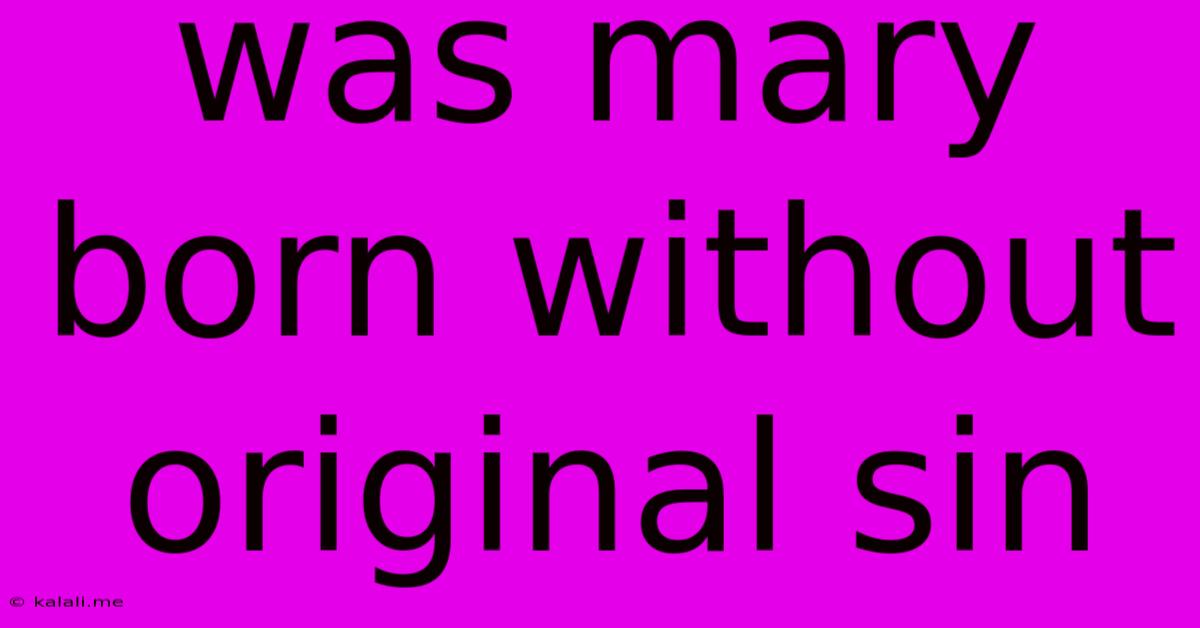Was Mary Born Without Original Sin
Kalali
Jun 06, 2025 · 3 min read

Table of Contents
Was Mary Born Without Original Sin? The Immaculate Conception Explained
The question of whether Mary, mother of Jesus, was born without original sin is a complex one, central to Catholic theology and a source of much discussion and debate. This article will explore the doctrine of the Immaculate Conception, clarifying its meaning and addressing common misconceptions. Understanding this doctrine requires careful consideration of its theological underpinnings and historical context. This detailed explanation will delve into the nuances of this important belief.
The Immaculate Conception does not refer to the conception of Jesus, as is often mistakenly assumed. Instead, it refers to the conception of Mary herself. Catholic doctrine holds that Mary was conceived without original sin, a unique privilege granted to her by God to prepare her for her role as the Mother of God. This is a key distinction and crucial to understanding the doctrine correctly.
Understanding Original Sin
Before diving into the Immaculate Conception, let's briefly define original sin. In Christian theology, original sin refers to the state of sin inherited by all humanity from Adam and Eve's disobedience in the Garden of Eden. This inherited sinfulness affects human nature, inclining individuals towards sin and separating them from God.
The Doctrine of the Immaculate Conception: A Theological Deep Dive
The Immaculate Conception, officially defined as dogma by Pope Pius IX in 1854, states that Mary, from the first instant of her conception, was preserved free from the stain of original sin. This wasn't a miraculous removal of sin after conception, but rather a unique grace bestowed upon her before her very existence. This preservation was necessary, theologians argue, to ensure that the Mother of God was entirely worthy to bear the Son of God, free from any taint of sin.
Several key theological points support this doctrine:
- Preparation for Jesus' Incarnation: Mary's sinlessness was seen as essential for the Incarnation of Jesus. A vessel free from sin was deemed necessary to carry the divine Son without any impediment. This underlines the profound significance of Mary's role in salvation history.
- The "Fullness of Grace": The doctrine emphasizes Mary's exceptional holiness and her complete openness to God's grace. Her Immaculate Conception illustrates the "fullness of grace" she received, setting her apart as a uniquely blessed individual.
- A Paradox of Grace: The doctrine acknowledges the paradoxical nature of divine grace. While all humanity is affected by original sin, God's grace can intervene in extraordinary ways, as exemplified by Mary's unique status.
- Unity of Mother and Son: The Immaculate Conception highlights the profound relationship between mother and son. Mary's purity reflects the purity of Jesus, further emphasizing the divine nature of the Christ.
Common Misconceptions and Criticisms
Several common misunderstandings surround the Immaculate Conception:
- Mary's Sinlessness Throughout Her Life: The Immaculate Conception only addresses her conception; it does not imply Mary was incapable of sin throughout her life. Catholic theology maintains she remained free from actual sin, but this is a separate theological point.
- A Diminishment of Jesus' Sacrifice: Some argue that Mary's Immaculate Conception diminishes the importance of Jesus' sacrifice on the cross. However, Catholic teaching maintains that both Mary's unique status and Jesus' sacrifice are essential components of salvation. One does not negate the other.
- Emphasis on Mary's Role: Critics sometimes argue that emphasizing Mary's role detracts from the central role of Jesus. However, Catholic teaching firmly places Jesus at the center of faith; the focus on Mary's Immaculate Conception serves to highlight her unique preparation for this pivotal role.
In conclusion, the Immaculate Conception is a complex and nuanced doctrine central to Catholic faith. It emphasizes Mary's unique holiness and her essential role in the salvation story. While interpretations and critiques exist, the doctrine remains a significant part of Catholic theological tradition. Understanding its meaning requires a careful examination of its historical context, theological underpinnings, and the distinct differences between this and the conception of Jesus.
Latest Posts
Latest Posts
-
Wiring A Ceiling Fan Blue Wire
Jun 07, 2025
-
E1 Heating To Print Temp Marlin
Jun 07, 2025
-
Hot Water Not Getting Hot Enough
Jun 07, 2025
-
Should I Both Brine And Marinate
Jun 07, 2025
-
How To Clean Jets In A Tub
Jun 07, 2025
Related Post
Thank you for visiting our website which covers about Was Mary Born Without Original Sin . We hope the information provided has been useful to you. Feel free to contact us if you have any questions or need further assistance. See you next time and don't miss to bookmark.